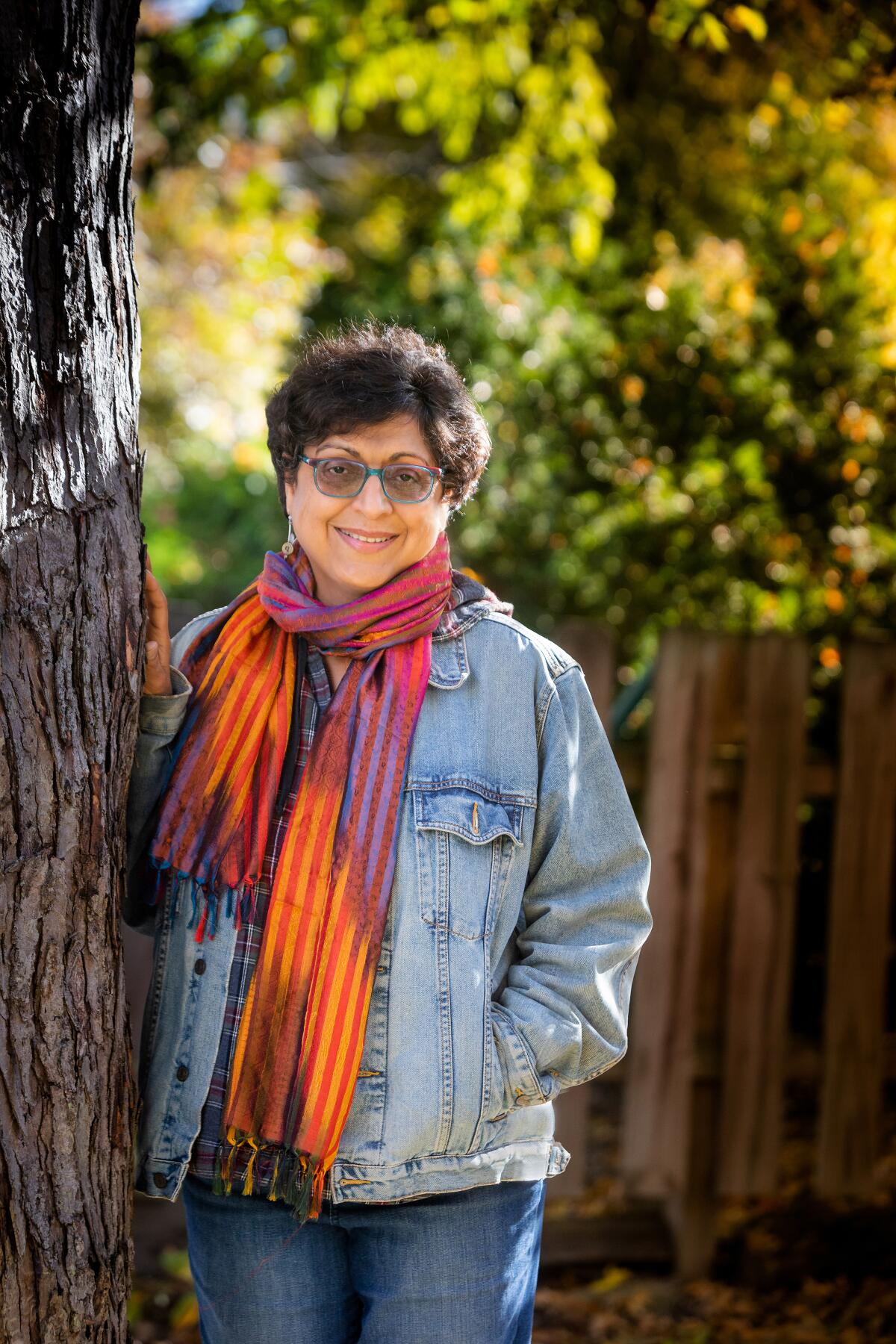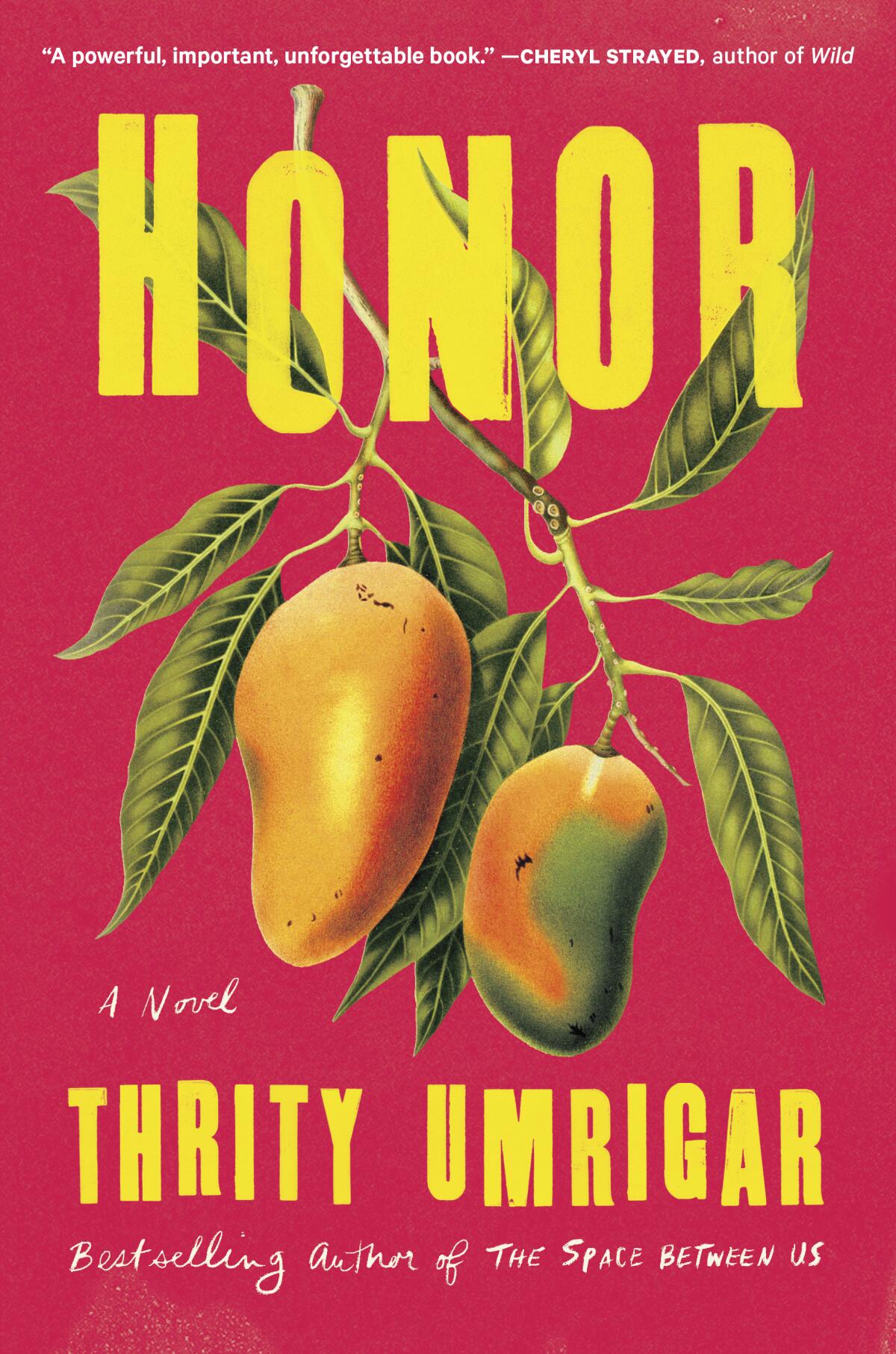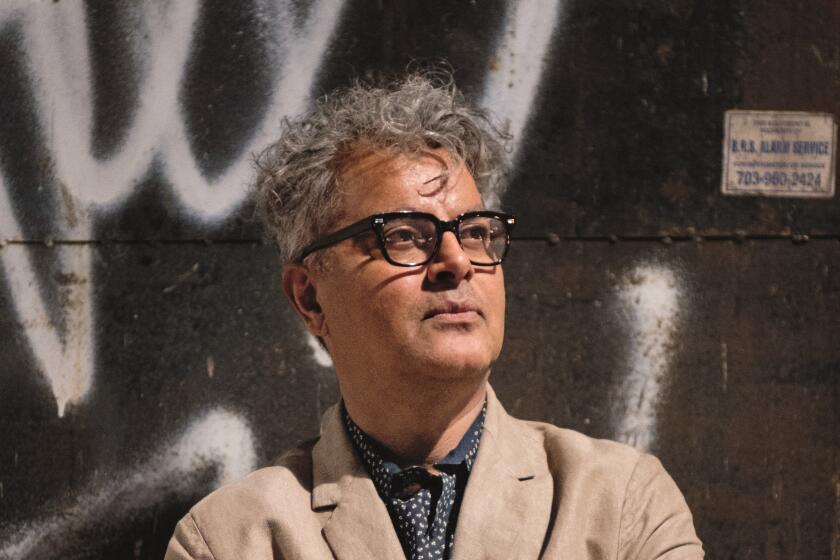A book of horror and hope in India, inspired by extremists closer to home

On the Shelf
Honor
By Thrity Umrigar
Algonquin: 336 pages, $27
If you buy books linked on our site, The Times may earn a commission from Bookshop.org, whose fees support independent bookstores.
Thrity Umrigar wants to talk about megachurches, which seems both apropos and slightly incongruous. Her new novel, “Honor,” turns on India’s two major faiths, Hinduism and Islam, and the violence that can erupt when an extremist faction holds sway.
“Honor,” which was announced this week as a Reese’s Book Club pick, involves — among many other events — a deadly clash between two brothers who believe India should be a Hindu theocracy and their sister’s husband, a Muslim from a nearby village. But Umrigar, whose eight previous novels have been set in both the United States and India, knows fundamentalism can spring from any faith.
“A thing for Western readers to realize about India is, guess what? We [Americans] have people doing crazy things, too. Maybe a few fundamentalist Christians pick up ‘Honor’ and think, ‘Wow, why do I believe what my pastor says when he’s saying the kinds of things that sound nutty coming from one of my characters’ mouths?’”
If this kind of secular awakening is unlikely, Umrigar thinks she might know why. “The follow-up question to why we have these megachurches, I think, should be what is the secular equivalent? What do we have that gives people the same sense of community and belonging, which I think is essential to the human spirit?”
She anticipates the answer, then flicks it away: “You can talk about libraries and books and museums, but those are almost by definition, sadly, becoming elitist. What provides the same sense of solace and neighborliness that a church does?”
Perhaps a writer? Umrigar is speaking from her home in Cleveland, Ohio, where she has lived since the age of 21 and works as a professor at Case Western Reserve University. Her elegant demeanor, literary references and Zoom backdrop — bookshelves, art objects — could be considered, objectively, elitist. But Umrigar possesses a level of curiosity and compassion I rarely encounter in other human beings, even the many curious and compassionate authors I’ve interviewed.
Amitava Kumar’s ‘A Time Outside This Time’ goes beyond autofiction to explore the novel’s potential to deliver deeper truths than the news cycle.
A clue to her perspective comes from Sarah Willis, a novelist and the fiction buyer at Loganberry Books in Cleveland who has known Umrigar for nearly 20 years. They meet regularly for lunch with a group informally known as “The Pen Women” to talk writing — but not always.
“Sometimes we talk about shoes!” Willis says. “But Thrity would never talk about shoes. She’ll bring up politics. She says she writes her books to understand the world, but one of the things she’s writing about is how people treat each other…
“She believes that words can change people — that the words themselves have power, not her. Her books are always about someone trying to change and become a better person.”
In “Honor,” that person is an Indian American journalist, Smita Agarwal, who reluctantly flies to India to help Shannon, a colleague sidelined with a broken hip. Shannon has been covering a powerful story about a young widow whose brothers killed her husband, Abdul, and disfigured her. The widow, Meena Mustafa, has decided to take her brothers to court, an almost unprecedented move in the realm of honor killings. Shannon pleads with Smita to travel to the remote village of Birwad and interview Meena before the trial.

When I tell Umrigar this book, with its strong romantic elements, seems like a slight departure from her other work, she smiles. “I’m delighted to hear you say so, because maybe that will attract other readers! But yes, OK, there are two parallel love stories in this book and maybe that’s a little different.” Nonetheless, she maintains, “I’m still writing about issues that haunt me, about power and power differentials.”
A cursory look at the summary above might suggest the plot turns on Smita’s power in the situation. Instead, “It’s Meena who ends up being the teacher,” Umrigar says. “She’s more radical and courageous than any of the characters who hold what we currently call privilege in the developed world. Meena actually does something,” first by defying deep taboos and then by defending her rights. “These are radical transgressions for which she pays a very, very heavy price. Yet she still manages to teach Smita and her companion Mohan” — an Indian executive she meets during the assignment — “a great deal about love and, yes, honor.”
Rishi Reddi’s “Passage West” plumbs an important story of Indian immigrant farmers, but isn’t quite up to the task as fiction
“Honor” is the first of Umrigar’s novels to be published by Algonquin Books; Executive Editor Kathy Pories says it was “the simplicity of the title,” with its many connotations, that first struck her. “You don’t know what it means until you read the book.” But it was the author’s “effortless writing” that made her want to work with her. “You trust her. You can tell that she has so much affection for India, through dark moments and beautiful moments both.”
For Umrigar, “India” is another word with many valences. “One of the things Smita winds up telling Mohan is ‘My India is not your India.’ She’s trying to tell him that the India he sees as developed and progressive is not the one in which she grew up, but her statement has a deeper meaning. India is multivarious, even for individual people.”
Mohan is perhaps the character most like the author. His India was once Umrigar’s too. She grew up there during the ‘60s and ‘70s, and “one of the joys of living in India at that time, at least in Bombay as it was called then, is that it was cosmopolitan and a genuinely secular city... But there has clearly been a backlash to all of that, with deep roots that are not simple. Remember, Gandhi was assassinated by a Hindu fundamentalist.” Decades later, she believes “the Hindu right wing realized there was political gain to be made from wielding power.”
Once again, Umrigar invokes a comparison closer to her present home.
“You have to understand that I wrote ‘Honor’ during the Trump years,” she says. “I was writing about India, but I was also writing about my own adopted country. This othering of others is not a phenomena you can assign to any one country. The trend winds are blowing across the world’s two largest democracies, India and the United States. I am sometimes appalled and bewildered and dismayed by the parallels.”
Trying to make sense of it, and perhaps to explain the role of a writer and her words, Umrigar invokes the playwright Tony Kushner, “who is one of my heroes. He says something to the effect of: Hope is not a choice. Hope is a moral obligation. I try and live by those words. I may sometimes not feel hopeful about my own personal circumstances, which is absurd because I’ve had every opportunity and privilege in the world. But I always feel hopeful about humanity.”
We asked four critics to name their five favorite books of the year. None of them overlapped. Here are their 20 candidates for best of the year
Patrick is a freelance critic who tweets @TheBookMaven.
More to Read
Sign up for our Book Club newsletter
Get the latest news, events and more from the Los Angeles Times Book Club, and help us get L.A. reading and talking.
You may occasionally receive promotional content from the Los Angeles Times.








